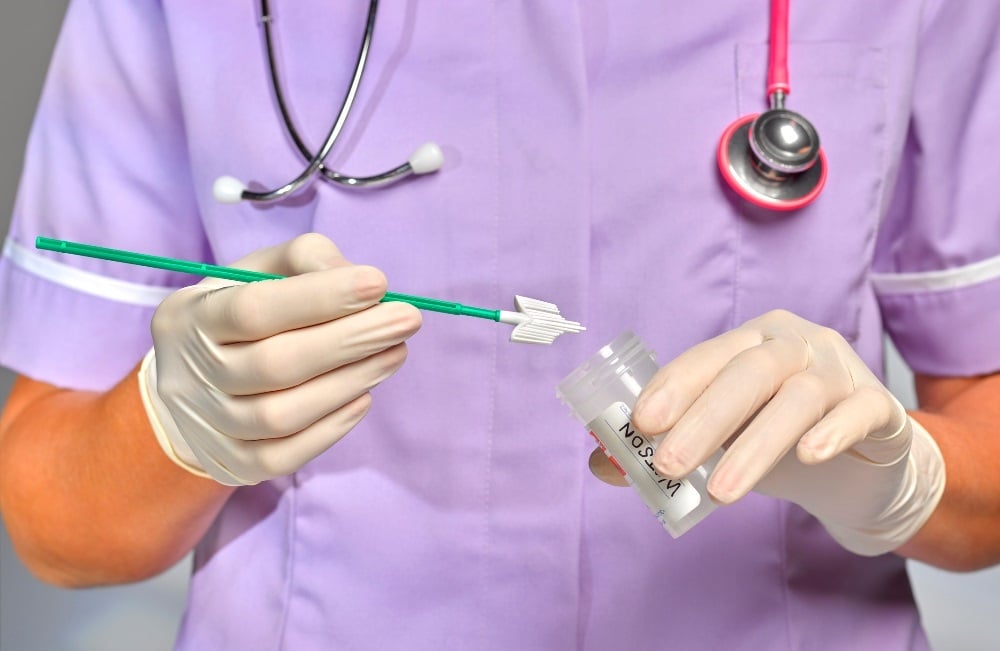
- There are significant gaps in the data when it comes to understanding South Africa's cancer burden.
- However, things are set to improve with an initiative that will allow members of the public to assist in data gathering.
- A new patient-led cancer registry will feed into South Africa's existing National Cancer Registry.
Cancer patients and other members of the public now have an opportunity to contribute to improving the quality and completeness of cancer data in South Africa, according to Spotlight.
This follows the recent launch of a new patient-led cancer registry. The project is a joint initiative of Living with Cancer (LWC), an NGO, and the existing National Cancer Registry (NCR) housed in the National Institute for Communicable Diseases (NICD).
While the NCR, Statistics South Africa (StatsSA), and others already provide important information about cancer in South Africa, there are substantial gaps in the existing data. As Spotlight reported last year, cancer incidence and deaths are believed by some to be grossly underreported in the country.
More than 85 000 people were diagnosed with cancer in 2019, and there were just under 44 000 registered deaths due to cancer in 2018, found a StatsSA report on cancer in South Africa (covering the period from 2008 to 2019).
However, the true numbers are likely higher. Salomé Meyer, of the Cancer Alliance, a civil society collective of cancer support organisations and advocates, tells Spotlight that cancer cases are massively underreported, in some cases roughly by 40%.
Associate Professor Glenda Davison, an expert in Haematology and Immunology at the Cape Peninsula University of Technology, explains that at the moment, cancer data in the country comes from the NCR which is overseen by the National Health Laboratory Services and run by the NICD.
READ | SA cancer payouts jumped almost 20% to R3.2bn last year, says Discovery
"The data collected here is from the laboratory with the pathology of the tumour or cancer and also the type of cancer being recorded. This will include all the laboratory results including the histology, cytology and bone marrow results. It also includes demographic data such as age, sex and population group," she says.
"There is also a registry for paediatric cancers as these are often different to adults. The data includes information on the pathology and all diagnostic criteria including the demographics of the patients. However, (it) has been criticised in that it lacks specifics on rare cancer types and services available for patients as well as therapy.
"There is also a lot of underreporting, with not all details being reported. So, the incidences are probably much higher than reported. Therefore, the full picture of cancer prevalence in SA is still unclear."
There are also selected population-based cancer registries currently based in Gauteng and KwaZulu-Natal that provide cancer data that is representative of the South African population, explained Dr Mazvita Muchengeti, the head of department at the NCR, during a press conference where the patient-led cancer registry was launched at the end of January.
“Reliable cancer statistics are essential in the planning of cancer prevention and control interventions in healthcare sectors." Dr Mazvita Muchengeti, Acting HOD of SA's National Cancer Registry at the launch of the population based cancer registry in KZN @MLCCProgramKZN #CIDERU pic.twitter.com/Jz3IbyBnnW
— NICD (@nicd_sa) February 28, 2023
She said that a population-based registry - considered to be the gold standard for cancer surveillance - is where all data on cancer cases within a defined population is collected. This means that cancer diagnosed through a pathology report, as well as those diagnosed by radiological means or symptoms and other signs, are counted by the surveillance teams. The registries generate reports on the specific region they operate in, for example, the one in Gauteng is in the Ekurhuleni District and gathers data on cancer cases in that district only.
This is different to the pathology-based registry, where cancer cases are only identified through pathology reports done at laboratories.
"It is not possible to do population-based registration in the whole country because it's very expensive, because it's active surveillance where we have nurses going into hospitals, [and] hospices collecting cancer data and going through patient records," Muchengeti says.
How the new patient-led registry will work
The LWC patient-led registry is the first of its kind in the country, Muchengeti and Belinda Wagner, the founder of LWC, tell Spotlight in a joint response. The registry is now ready to be used by the public after a memorandum of understanding was signed last year between LWC and the NCR.
The patient-led registry, which is accessible via the LWC website, allows individuals to register cancer patients and give information about the patient and their diagnosis.
Muchengeti and Wagner tell Spotlight that the data is then fed directly into the existing NCR and used to validate and improve existing data as well as capture cancer patients that have been missed. The data can also be used to identify gaps in the NCR's surveillance system. Patients from both the private and the public healthcare sector can supply data to the LWC registry.
Muchengeti clarified:
"Identifiers such as names, ID, place of diagnosis will be compared across the two registries to check for those already in our registry. If key information (such as population group, which is often missing in private sector data) is missing, this information can be added to the NCR record."
Wagner, during the press conference where the registry was launched ahead of World Cancer Day on 4 February, added that LWC, while being the first patient-led registry in South Africa, will also provide those who join with support and access to resources to assist in their cancer journey.
READ | World cancer body's call to action to close the care gap
"We can work together to get a real understanding of the state of cancer in South Africa. The truth is not everyone survives cancer, right? But collectively, we can drive the change and transform the landscape of cancer care in South Africa by harnessing the power of technology and collective action, we can ensure that no one faces this disease alone anymore," she said.
Commenting on the registry, Davison says it is a "very valuable initiative in that it will provide patient driven information as well as track patients progress which is missing from the national registry".
Patient privacy
An obvious concern some users will have with such a system is the privacy and security of their data.
"We are aware of the need to protect sensitive information and have ensured we comply with South African data protection laws, especially the POPI Act," Muchengeti and Wagner tell Spotlight.
"Employees, volunteers, and stakeholders adhere to the policy. We are committed to ensure privacy, security, and compliance with POPI Act."
Yesterday, the National Cancer Registry (NCR), housed within the NICD, joined Pink Drive for a World Cancer Day event in Laudium, Pretoria. The event was graced by Minister of Health, Dr Joe Phaahla, and the Gauteng MEC of Health, @NkomoNomantu. pic.twitter.com/9wDgEcLb5G
— NICD (@nicd_sa) February 7, 2024
They say the data is stored at Afrihost (an internet service provider) in a secure database, and that the database permissions do not allow LWC employees to access the actual data, but only allow for reporting on the data.
"The data will be exported to the NCR through the use of an API [Application Programming Interface], again ensuring all data transfer is encrypted to protect records. Similar exports are used by pathology laboratories when reporting to the NCR," they say.
READ | Gauteng cancer patients in R784 million treatment deal dilemma
At the launch, Muchengeti told Spotlight that under Regulation 380 of the National Health Act, employees from the NCR are allowed to view identifiable data of patients (both those within the NCR and LWC registry) in order for that data to be curated, analysed and put into reports. However, data that contains identifiable, patient-level information to anyone. The only data that is ever released by the NCR is aggregated data.
"Our data processing includes de-duplication of the entire database (going back to 1986) to ensure that cancer recurrences are not counted as new cancers when the patient was first diagnosed several years before. Therefore, duplicates are removed, and the source of the data is indicated in the pathology report, and we do know which cancers have been reported from private sector and which ones from the public sector laboratories (the NHLS)," she adds.
Reasons for underreporting
Meyer tells Spotlight there are several reasons for underreporting of cancer data. These include the fact that the NCR is a pathology-based registry, yet not all cancers are diagnosed via a pathologist's report, and that some cancers remain undiagnosed.
Within the public sector, Meyer also lists a lack of access to the healthcare system, ineffective referral processes within the system, lack of patient knowledge and presenting to the health system only in the late stages of disease, as being factors that contribute to an underreporting of cancer.
READ | Crippled: How public health system budget cuts injure all – even those who have medical aid
Meyer also highlights that because deaths in the country are not reported via primary cause, a cancer patient could die of a heart attack and the cause of death listed would be "heart attack" instead of cancer, and thus not feature in the data on cancer mortality.
Traditional leaders are also able to report cause of death, but don't necessarily have the medical training to do so accurately, which also causes issues with the accuracy of cause of death data.
Spotlight contacted the national Department of Health for comment on their role in this database but received no comment by the time of publication.
*This article was published by Spotlight – health journalism in the public interest. Sign up to the Spotlight newsletter.




 Publications
Publications
 Partners
Partners























